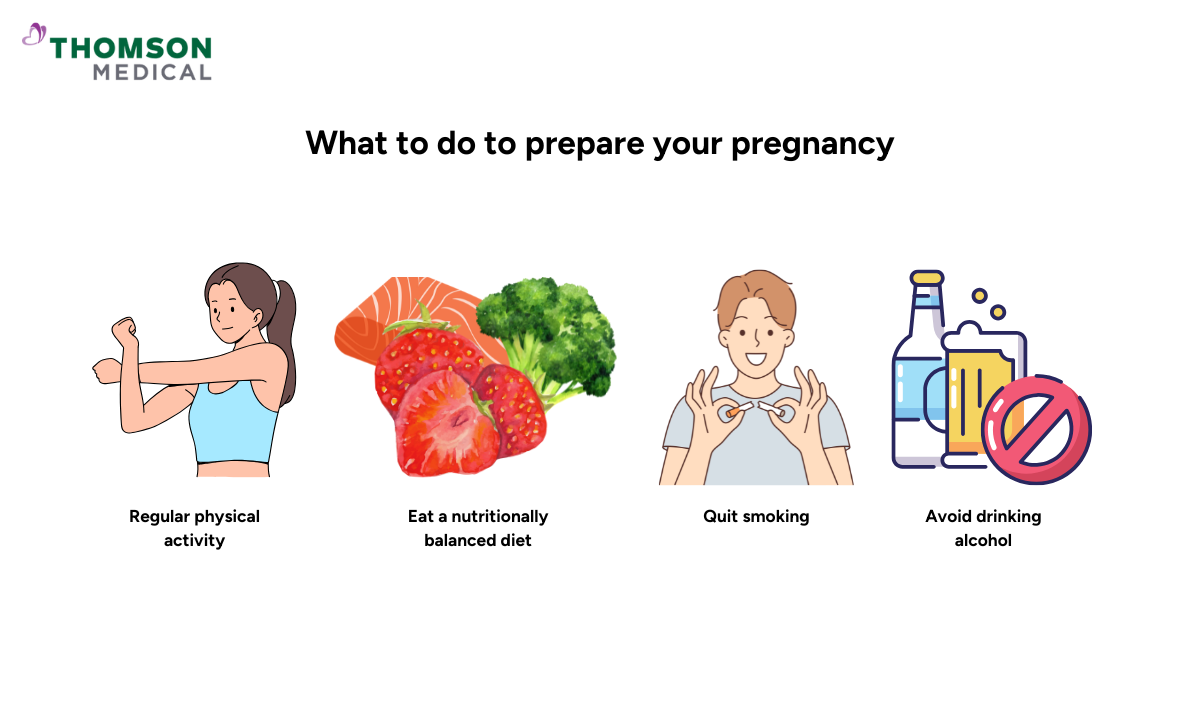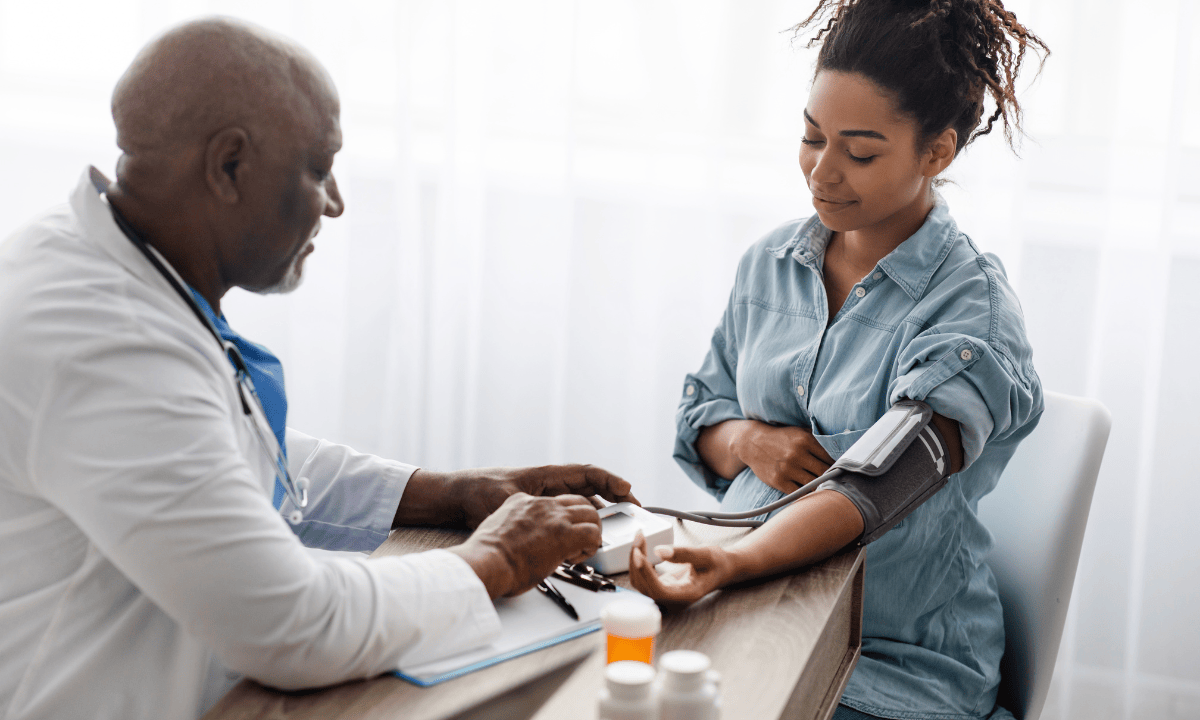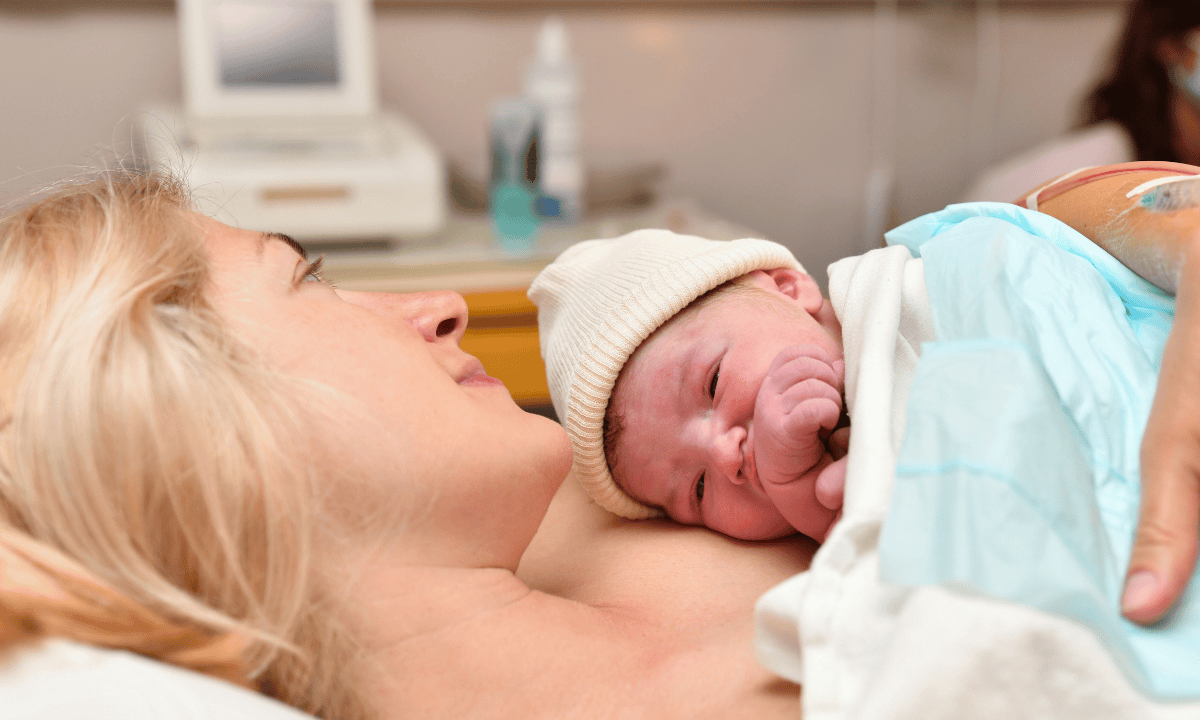The journey to motherhood can be a joyful and exciting time, but it also brings with it many new and demanding challenges. With so many physical and emotional changes from start to finish – planning and preparing for pregnancy, experiencing the three trimesters, having a baby and recovering after birth.
So it is important to equip yourself with the information you need to have a successful and healthy pregnancy.
1. Planning and preparing for pregnancy
Pregnancy and childbirth put extra stress on your body, so it's important to start your pregnancy with a healthy mind and body. There are several ways to do this, including:

Getting pregnant during peak fertility age
The optimal age for women's fertility is usually between their early 20s and mid-30s, as women's fertility starts to decline around the age of 35. Women over 35 are more likely to have difficulty getting pregnant, experience miscarriages, and have an increased risk of the babies having Down syndrome.
They are also more likely to have pregnancy complications such as high blood pressure (hypertension), pre-eclampsia (high blood pressure with high levels of protein in the urine) and diabetes.
Avoid drinking alcohol
Drinking alcohol during pregnancy may affect your hormone levels, menstruation and ovulation, which can affect your fertility. Alcohol can also increase the risk of miscarriage, premature births, stillbirths, smaller babies, and birth defects.
Avoid smoking
Studies have indicated that babies born to mothers who smoke or are exposed to second-hand smoke are more likely to be born prematurely and have a lower birth weight.
Eat a healthy and balanced diet
It is best to avoid highly processed fatty foods, sugary drinks and caffeine during pregnancy. Limit your caffeine intake to no more than two cups of coffee a day. It's also recommended that you eat plenty of healthy foods, such as fruits (especially citrus fruits), leafy vegetables, whole grains, low-fat dairy products, and lean proteins during pregnancy.
Additionally, remember to stay hydrated by drinking plenty of water (6-8 glasses) each day.
Frequent exercise
Getting 30 minutes of exercise a day, or 150 minutes a week, is beneficial for pregnant women and women who are trying to get pregnant. Exercise also helps to maintain or lose the weight needed to keep your body mass index (BMI) below 25.
Obesity is associated with pregnancy complications, such as high blood pressure, gestational diabetes, and difficult labour.
Taking prenatal vitamins
It is recommended that you take prenatal vitamins before you become pregnant and during your pregnancy. Folic acid, or folate, is a type of vitamin B that is needed for the development of the baby's nervous system and the formation of blood cells.
Taking at least 400 micrograms of folate or folic acid at least 3 months before becoming pregnant can reduce the risk of birth defects of the brain and spinal cord, also known as neural tube defects.
Good hygiene
Pregnant women should practise good hygiene habits, such as washing their hands. This can help reduce the risk of harmful infections such as toxoplasmosis and cytomegalovirus. If you have a pet cat, you should also avoid changing the cat's litter, as this has been linked to toxoplasmosis infection.
2. Pre-pregnancy health screening
It is important to see your doctor for antenatal care about three months before you try to get pregnant. They can review your medical history and assess any new risks that need to be addressed.
This is particularly important if you have a history of high blood pressure, diabetes, thyroid problems or previous pregnancy complications such as preterm labour, pre-eclampsia, placental abruption or poor pregnancy outcome.
Your doctor may carry out pre-pregnancy tests, which may include:
A physical examination to check your weight, blood pressure and pulse rate.
A pelvic and vaginal examination.
A cervical smear to check for cervical cancer.
A pelvic ultrasound scan to check for fibroids and ovarian cysts.

It is also important to ensure that your blood pressure is less than 135/85 mmHg and that your diabetes is under control with a target HbA1C of 6.5% to ensure a healthy pregnancy. Blood tests, such as a health screening panel, can also check whether you are medically fit to become pregnant.
If you are planning to become pregnant, it is important to ensure that you are in a good physical condition to conceive. To ensure a smooth pregnancy experience, request an appointment with Thomson Medical for a pre-pregnancy medical assessment.
3. Pre-pregnancy fertility checkup
Before trying to conceive, it's recommended that couples see their doctor for fertility check-ups and seek early help if needed to ensure your fertility and chances of getting pregnant. As part of the fertility check-up, your doctor may order tests that include:
Hormone profiles, such as measuring follicle-stimulating hormone (FSH), luteinising hormone (LH), oestradiol and thyroid function for hormonal imbalances that may affect your fertility.
Ovarian reserve, such as the anti-Müllerian hormone (AMH) test, which is an indicator of a woman's egg supply.
Ovulation assessment by measuring the hormone levels in the blood.
Male semen analysis is used to assess the quality, quantity, and motility of sperm.
4. Confirming your pregnancy and coping with the changes
If couple successfully tested positive after taking a pregnancy test. It is recommended to see your obstetrician and gynaecologist (obgyn) around 7–8 weeks from the first day of your last menstrual cycle to confirm the pregnancy and establish the estimated due date (EDD).
You should consider arranging for an earlier doctor’s visit if you show any signs and symptoms of pain or bleeding, have a history of previous ectopic pregnancy (pregnancy outside the womb), and have any pre-existing medical conditions like hypertension or diabetes that may lead to a high-risk pregnancy.
 If this is your first pregnancy, it might help to read up about the physical effects of pregnancy so that you are prepared to cope with these changes. Some common effects that come with pregnancy include backache, foot swelling, nausea and vomiting, heartburn, frequent urination, and constipation.
If this is your first pregnancy, it might help to read up about the physical effects of pregnancy so that you are prepared to cope with these changes. Some common effects that come with pregnancy include backache, foot swelling, nausea and vomiting, heartburn, frequent urination, and constipation.
However, a small proportion of women may experience more severe symptoms, or "warning signs", that warrant a doctor's visit. These include persistent vomiting, feeling faint, abdominal pain, vaginal bleeding, or watery vaginal discharge.
To support mothers in managing pregnancy changes, request an appointment at Thomson Medical. Our obstetricians and gynaecologists can help you navigate this transition and offer personalised recommendations based on your specific pregnancy needs.
5. Having a comprehensive antenatal care plan
Pregnancy can be divided into the first, second, and third trimesters. After knowing your EDD, your doctor will also go through the antenatal care plan with you from the 1st to 3rd trimester.
First trimester
During the 1st trimester, it is important to do antenatal blood tests to test for infections, screen for anaemia, and test for genetic conditions like thalassaemia, blood group type and rhesus status.
Afterwards, first trimester screening (FTS) for chromosomal problems like Down syndrome can be performed using ultrasound or blood tests known as non-invasive prenatal testing (NIPT).
In addition, pre-eclampsia screening can be done. Your doctor will recommend you take aspirin from the 12th week of pregnancy if you are screened as high-risk for developing pre-eclampsia before 37 weeks of pregnancy.
Second trimester
During the 2nd trimester, a detailed ultrasound known as a foetal anomaly scan is performed at around 20 weeks of pregnancy to detect any structural birth defects that can affect 3–5% of all pregnancies.
Third trimester
During the 3rd trimester, an oral glucose tolerance test (OGTT) to test for gestational diabetes (GDM) is done at around 24-28 weeks of pregnancy.
The OGTT may be performed earlier during pregnancy if there are any risk factors for developing diabetes, such as a previous history of GDM, a prior history of having a large baby, a history of stillbirth, or persistent glucose in a urine sample.
At about 35 weeks of pregnancy, your doctor will do a lower vaginal swab to screen for Group B Streptococcus (GBS) infection, a common bacteria found in the vagina. Antibiotics will be prescribed in labour to reduce the risk of GBS infection to the baby if GBS is detected.
6. How to stay healthy during pregnancy?
On top of the antenatal care plan, your doctor will also advise you on how to stay healthy during pregnancy. You and your doctor will also undergo an in-depth discussion including the optimal diet during pregnancy, physical activity, weight gain, good hygiene, and identifying any underlying medical illness so that they can properly cater the advice for you.

7. Planning for labour and delivery
It is a good idea to consider attending antenatal classes and having regular check-ups with your doctor. It is also a good idea to consider a childbirth plan that best suits your preferences and needs.
A full-term pregnancy lasts between 37 and 40 weeks. If you experience signs and symptoms of early or established labour, such as regular, painful contractions; vaginal bleeding with a "bloody" appearance; or clear fluid leakage, you should go to the hospital immediately.
You may be offered medication to induce or speed up labour. Your doctor will decide whether to have your baby vaginally or by caesarean section, depending on several factors.
8. Post-delivery care

After you've successfully delivered your baby, mothers are encouraged to have skin-to-skin contact to form a special bond with your baby. Immediate postnatal care consists of wound care with pain relief, medication to prevent constipation, possible antibiotics, blood thinning injections to prevent blood clots, and vitamins.
The paediatrician will examine your baby and carry out developmental checks and blood tests for metabolic disorders and jaundice.
9. Breastfeeding
Breastfeeding the baby is recommended for at least 6 months, without feeding them any other food or drinks during this time. The benefits of breastfeeding include maternal weight loss, providing your baby with sufficient nutrients and antioxidants, boosting their immune system, and lowering the risks of allergies and eczema. It will also help you form a bond with your baby.
10. Gradual post-delivery recovery
It is recommended to continue practising healthy eating habits, regular physical activity, having adequate rest, and looking after your mental well-being after delivery to help you return to a healthy weight. Afterwards, you can gradually increase the intensity of the physical activity.
The information provided is intended for general guidance only and should not be considered medical advice. For personalised recommendations and tailored advice, please consult an obstetrician and gynaecologist at Thomson's Women Clinic.
FAQ
What are the five warning signs of a possible pregnancy problem?
Five important pregnancy-related warning signs you should look out for include:
A severe headache that won't go away or gets worse over time.
Dizziness or fainting.
Extreme swelling of your hands or face.
Trouble breathing.
Chest pain or fast-beating heart.
What are the symptoms of an unhealthy pregnancy in the first trimester?
Some symptoms of an unhealthy pregnancy include severe belly pain that doesn’t go away, nausea, vomiting, vaginal bleeding/fluid leaking, and the baby’s movements stopping or slowing down during pregnancy.
What to drink when pregnant?
Drinking water is the most ideal drink when you are thirsty. It is not recommended to drink coffee, energy drinks and herbal teas, as it is best to limit caffeine intake during pregnancy, and some herbal teas may contain ingredients that are not suitable for pregnant women.
How can I have a good pregnancy?
One of the best ways to have a good pregnancy and protect both yourself and the baby is to stop smoking, drinking alcohol and using drugs when you are trying to conceive or as soon as you find out you are pregnant.
Which trimester is the hardest?
The first trimester is often the most challenging period for pregnant women, as your body needs time to adapt to pregnancy hormones and symptoms such as extreme fatigue, nausea and vomiting (morning sickness).
What week is the highest risk of miscarriage?
Your chance of miscarriage is highest when you first find out you're pregnant—around weeks 3 or 4. During weeks 3 and 4 of pregnancy, the miscarriage rate is roughly 25% to 33% of all pregnancies. After week 4, the rate drops to 15% to 20% between weeks 5 and 6.
The information provided is intended for general guidance only and should not be considered medical advice. For personalised recommendations and tailored advice, please consult a specialist by requesting an appointment with Thomson Medical today.
For more information, contact us:
Thomson Specialists (Women's Health)
- Paragon (female doctor): +65 6735 0300
- Woodleigh: +65 8684 0153
Thomson Women's Clinic (TWC)
- Bukit Batok: +65 6569 0668
- Choa Chu Kang: +65 6893 1227
- Jurong: +65 6262 8588
- Punggol: +65 6243 6843
- Sembawang: +65 6753 5228
- Sengkang: +65 6388 8125
- Serangoon (female doctor): +65 6382 3313
- Tampines: +65 6857 6266
- Tiong Bahru: +65 6276 1525
Dr Ryan Lee Wai Kheong
Obstetrics & Gynaecology (O&G)
Thomson Specialists Woodleigh (Women's Health)
English, Mandarin
Adept, MHC, HSBC, Alliance MediNet and 1 other

